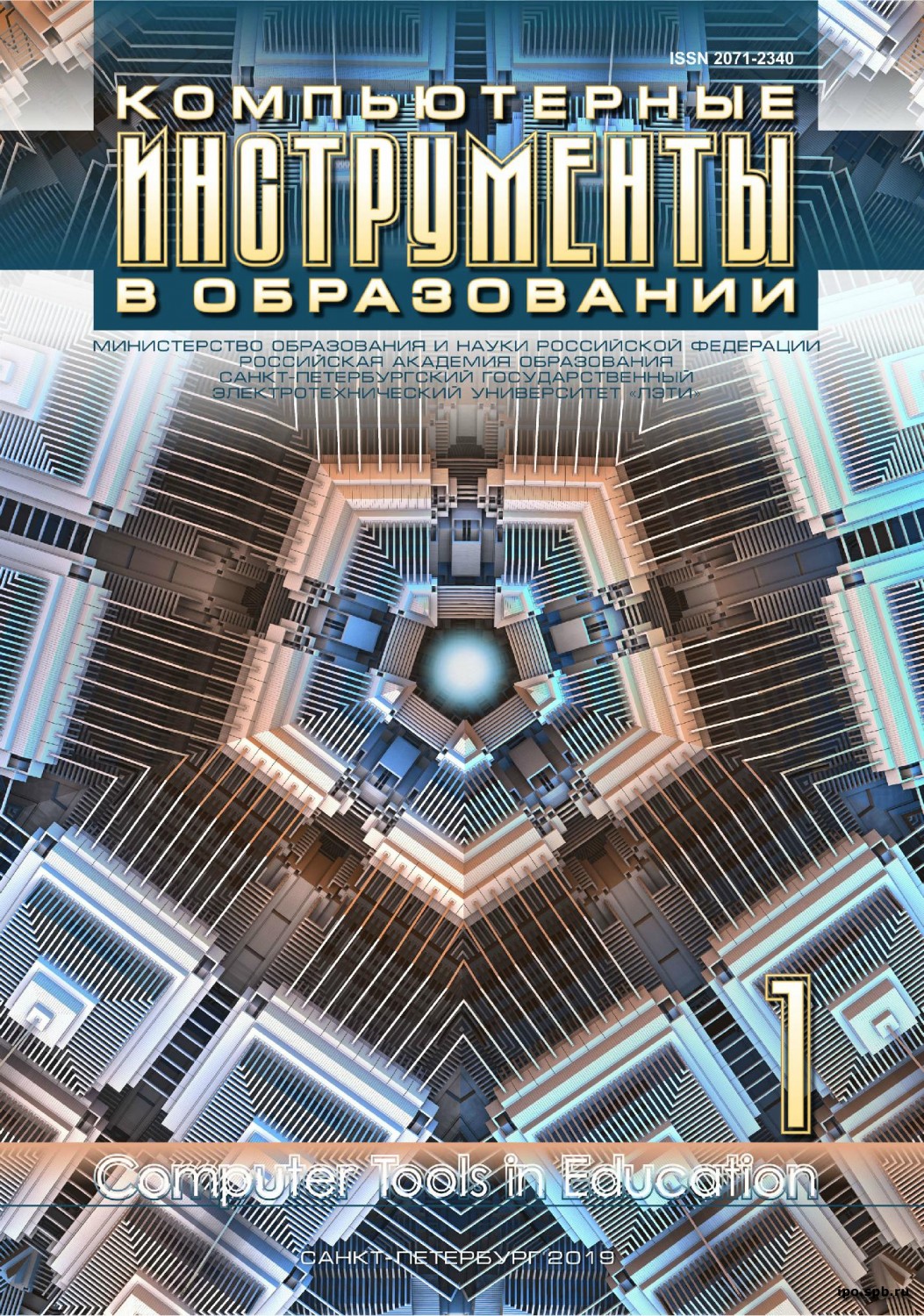Solving logical tasks based on predicate models using generator of configurations
Abstract
In this study, the method of solving logic tasks by declarative language Prolog based on the method of searching in the space of configurations is identified and analyzed. The essence of the method is to declare the generator of configurations, which forms the search space, and the selection procedure for sifting the constructed States according to a certain principle. The study proposes a classification of solutions by this method. Described a formal model of the decision of following problems: The generalized problem of the crossing, The task of the blood work and The problem of constructing code words. For the description of objects and their configurations it is offered to use bit chains, and for generation of the next state - bit operations. The described approaches to the construction of the desired options allow us to find all possible solutions of a given dimension. The perspectives of the generating rules of the knowledge base. The examples of declarative models obtained in the course of the study are used in teaching the course <<functional and logical programming>> at the Altai State University.
References
R. Benerdzhi, Teoriya resheniya zadach. Podkhod k sozdaniyu iskusstvennogo intellekta [Theory of problem solving. Approach to the creation of arti1cial intelligence], Moscow, USSR: Mir, 1972 (in Russian).
N. Nilson, Iskusstvennyi intellekt. Metody poiska reshenii [Arti1cial Intelligence. Solution Search Methods], Moscow, USSR: Mir, 1972 (in Russian).
D. F. Luger, Iskusstvennyi intellekt: Strategii i metody resheniya slozhnykh problem [Arti1cial Intelligence: Strategies and Methods for Solving DiWcult Problems], 4th ed., Moscow, Russia: Williams, 2003 (in Russian).
S. Rassel and P. Norvig, Iskusstvennyi intellekt. Sovremennyi podkhod [Arti1cial Intelligence. Modern approach], Moscow, Russia: Williams, 2006 (in Russian).
S. A. Kotelenko, “Yazyk Prolog i realizatsiya kontseptsii SemanticWeb” [Prolog language and implementation of the concept of SemanticWeb], Izvestiya Yuzhnogo federal’nogo universiteta. Tekhnicheskie nauki, vol. 27, no. 4, pp. 121–128, 2002 (in Russian).
V. V. Devyatkov and M’e Tkhet Naung, “Mul’tiagentnyi analiz pravil’nosti spetsi1katsii protokolov initsiirovaniya seansov” [Multi-agent analysis of the correctness of the session initiation protocols], Vestnik Moskovskogo gosudarstvennogo tekhnicheskogo universiteta im. N.E. Baumana. Seriya “Priborostroenie”, no. 2, pp. 107–116, 2015 (in Russian).
A. A. Morozov and O. S. Sushkova, “Analiz videoizobrazhenii v real’nom vremeni sredstvami yazyka Aktornyi Prolog” [Real-time video image analysis using Actor Prolog language], Computer optics, vol. 40, no. 6, pp. 947-–957, 2016 (in Russian); doi: 10.18287/2412-6179-2016-40-6-947-957
O. N. Poloikova, “Formalizatsiya protsessa postroeniya resheniya s ispol’zovaniem spiskov dlya klassa ogicheskikh zadach v programmakh na yazyke Prolog” [Formalization of the decision building process using lists for a class of logical problems in Prolog programs], Izvestiya Altaiskogo gosudarstvennogo universiteta, vol. 69, no. 1, pp. 117–120, 2011 (in Russian).
M. G. Mezhenin, “Obzor sistem protsedurnoi generatsii igr” [Review of procedural game generation systems], Vestnik Yuzhno-Ural’skogo gosudarstvennogo universiteta. Seriya: Vychislitel’naya matematika i informatika, vol. 4, no. 1, pp. 5–20, 2015 (in Russian); doi: 10.14529/cmse150101
N. Shaker, J. Togelius and M. Nelson, Procedural Content Generation in Games. Computational Synthesis and Creative Systems: A Textbook and an Overview of Current Research, Springer, 2016.
M. B. Il’yashenko and A. A. Goldobin, “Reshenie zadachi poiska izomor1zma grafov dlya proektirovaniya spetsializirovannykh vychislitelei” [The solution of the problem of searching for isomorphism of graphs for designing specialized calculators], Radioelektronika, informatika, upravlenie, no. 1, pp. 31–36, 2012 (in Russian).
L. Kalinichenko, D. Kovalev, D. Kovaleva, and O. Malkov, “Methods and tools for hypothesisdriven research support: Ç survey,” Informatics and applications, vol. 9, no. 1, pp. 28–54, 2015; doi: 10.14357/19922264150104
P. A. Shrainer, Osnovy programmirovaniya na yazyke Prolog: kurs lektsii, Moscow, Russia: Internet – Un-t Inform. Tekhnologii, 2005 (in Russian).
O. N. Polovikova, “Generator parametrov dlya postroeniya vyrazheniya k matematicheskoi zadache na yazyke Prolog” [Parameter generator for constructing an expression for a mathematical problem in the Prolog language], Lomonosovskie chteniya na Altae: fundoment. problemy nauki i tekhn., sbornik
statei mezhdunarodnoi konferentsii, pp. 724–725, 2018 (in Russian).
I. A. Brusakova and S. O. Mamaeva, “Sistema upravleniya bazami izmeritel’nykh znanii,” Prikladnaya informatika, no. 5, pp. 93–97, 2006 (in Russian).

This work is licensed under a Creative Commons Attribution 4.0 International License.







